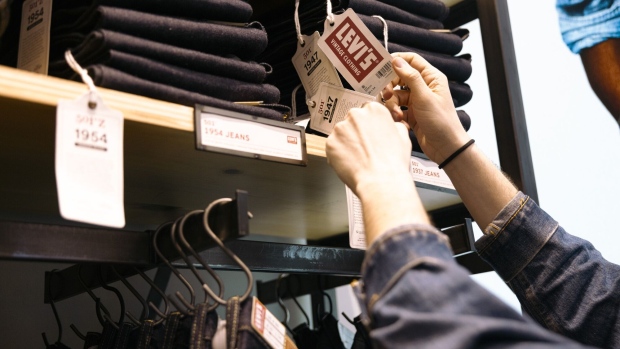Jun 26, 2024
Levi Falls After Reporting Revenue Slightly Below Estimates
, Bloomberg News

(Bloomberg) -- Denim maker Levi Strauss & Co. fell as much as 18% on Thursday after the company reported quarterly sales that fell just short of estimates, underscoring Wall Street’s high expectations for the company.
Revenue was $1.44 billion in the company’s fiscal second quarter which ended May 26, versus the average analyst estimate of $1.45 billion. Sales in the Americas were strong, but fell short of expectations in Europe and Asia. Profit beat expectations but the company reaffirmed its full-year outlook.
The share decline was the most on record for Levi, which went public in a 2019 offering. Levi stock had advanced 40% so far this year through Wednesday’s close. The company’s results were released after the close.
“Although their sales growth looks OK, Wall Street was expecting more given the current popularity of denim and the fact Levi’s was up against a very soft comparative from 2023 when sales shrunk,” said Neil Saunders, retail managing director at GlobalData. He added that full-year guidance is “quite cautious given that last year revenues came in flat.”
San Francisco-based Levi sees full year earnings per share, excluding some items, in a range of $1.17 to $1.27, with the average analyst estimate at $1.27.
While executives voiced optimism about the company’s sales trajectory, Chief Financial and Growth Officer Harmit Singh said that foreign exchange volatility, especially related to the euro and the Mexican peso, are offsetting some of the gains.
“Despite the supportive trends, headwinds from foreign exchange have recently increased,” Singh said in a call with analysts.
The company says its efforts to sell more apparel directly to consumers via Levi’s own stores and website are bolstering profitability.
As Levi prioritizes its direct sales, Citi analyst Paul Lejuez expressed concern about sales from the wholesale channel, which fell short of the average of two analyst estimates in the latest quarter. “While brand strength seems strong, wholesale is still holding them back, and there is risk that Europe doesn’t improve” in the second half of the year, he said.
In an interview, Singh cited upcoming elections in the US, France and the UK, adding that economic uncertainty has “become a part of life” for most companies. He said that gross margin, which surpassed market expectations in the most recent quarter, is expanding due to the company’s focus on women’s apparel and its own sales channels.
©2024 Bloomberg L.P.


